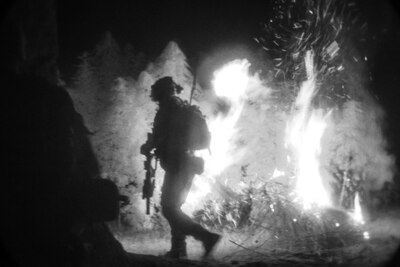By Jim Garamone DoD News, Defense Media Activity
WASHINGTON, Dec. 12, 2017 — Government forces are developing
momentum that will mean a very bad fighting season for the Taliban and other
enemies of Afghanistan, Air Force Brig. Gen. Lance Bunch told Pentagon
reporters today.
Bunch, the chief of the Resolute Support Mission’s future
operations division, said the new South Asia strategy President Donald J. Trump
announced in August and the new permissions that flow from that fundamentally
changed the battlefield in favor of Afghan national security forces.
New Strategy
The new strategy is conditions based -- meaning the coalition
will remain in place until conditions improve to the point that Afghan forces
can maintain security on their own. This means the Taliban and other terror
groups like the Islamic State of Iraq and Syria, al-Qaida, the Haqqani group
and others, cannot wait out the coalition. “As [Army] Gen. [John W.] Nicholson
has stated, we will be here until the job is done,” Bunch said. Nicholson is
the commander of the Resolute Support mission and U.S. Forces Afghanistan.
Afghan forces and the coalition have already changed tactics
and this is having an effect on the Taliban, Bunch said. His shop developed a
sustained air interdiction campaign aimed at eliminating the drugs that are at
the heart of the Taliban. “Using air power, we have been able to target the
Taliban in their so-called safe zones, command-and-control nodes, illicit
revenue-generating ventures, and their logistical networks,” he said. “This new
air interdiction campaign directly strengthens the Afghan defense forces and
their continued battlefield successes.”
Bunch said the Taliban receives about $300 million to $400
million a year with about $200 million of it coming from the production of
heroin.
“Since the beginning of this campaign, we have eliminated 25
narcotics processing labs from the Taliban inventory,” the general said. “This
equates to almost $80 million of drug money eliminated from the kingpins'
pockets, while denying over $16 million of direct revenue to their Taliban
partners.”
The strikes come from coalition air forces, the Afghan air
force and other coalition fires.
“Additionally, the Afghan National Interdiction Unit
conducted two simultaneous raids of Taliban narcotics bazaars, as part of this
integrated campaign.” This, he said, resulted in more than 2 tons of heroin and
more than 5.5 tons of opium being seized.
The strikes caught Taliban leaders off guard, and that
enabled the killing of Taliban “Red Squad” commander Mullah Shah Wali. Bunch
called this a severe blow to the Taliban’s criminal network. “Again, the
Taliban have never had to face a sustained targeting campaign focused on
disrupting their illicit revenue activities,” he said.
The campaign continues and Bunch promised the Taliban will
face a long winter “as we will continue to disrupt their revenue sources again
and again and again.”
Change is coming to yet another aspect of the fight as
Resolute Support advisers and trainers will begin working with Afghan kandaks
-- a unit roughly comparable to battalions. “This change allows our forces to
train, advise and assist Afghan units and leaders directly controlling the
fight and accelerate the transition to increased capability and capacity,”
Bunch said.
This aspect of the fight will kick into high gear when a new
U.S. Army security force assistance brigade deploys early next year. This will
“further enhance our advising of the Afghan defense forces going into the next
fighting season,” he said.
Bleak Future for Taliban
The Taliban face a bleak future. “They have been completely
unable to achieve any objectives from their declared Operation Mansouri during
this fighting season,” Bunch said. “In addition to their unrealistic goals,
they have been unable to take a provincial capital or even a single city. This
year the Taliban and have fared poorly.”
The terror group was forced to stop combat operations and a
return to high-profile attacks, kidnappings for ransom and assassinations, the
general said. “These are heinous acts of violence that bring attention to their
group and indiscriminately target the Afghan people, resulting in unimaginable
suffering,” he said.
Now the momentum is clearly with the Afghan defense forces.
“Our coalition is proving the enemy's theory of victory is wrong: They believed
they would win because we lacked political will,” Bunch said. “They
underestimated us, and they underestimated the will of the majority of the
Afghan people. Eighty-seven percent of the Afghans believe the Taliban is bad
for Afghanistan.”








No comments:
Post a Comment